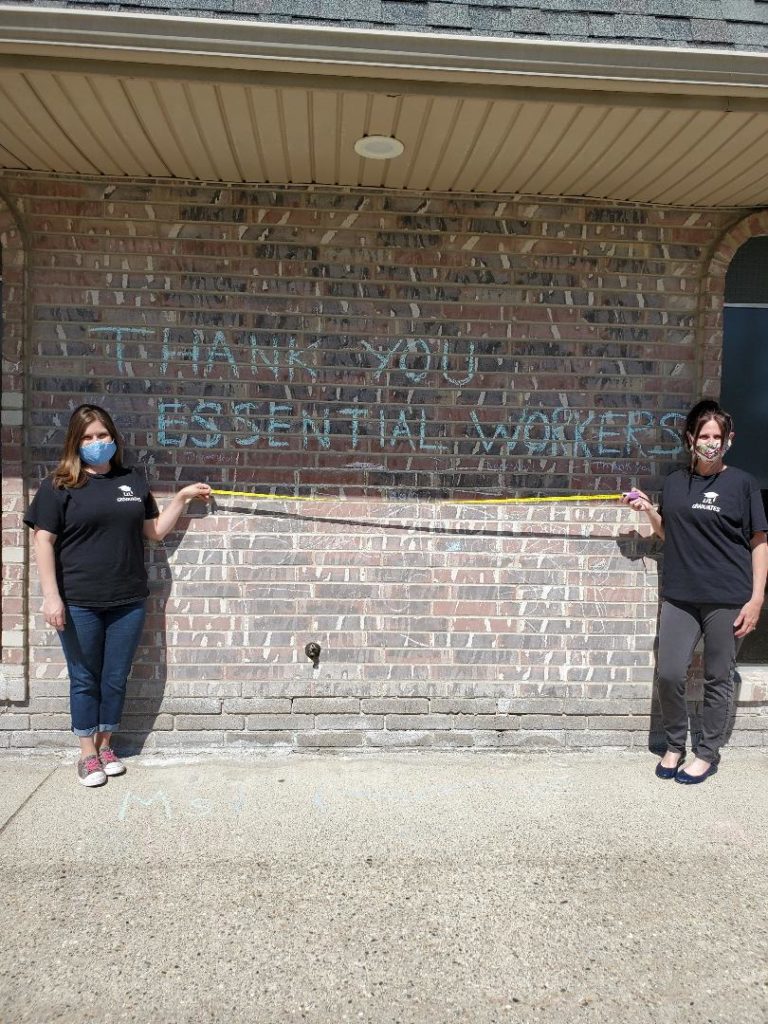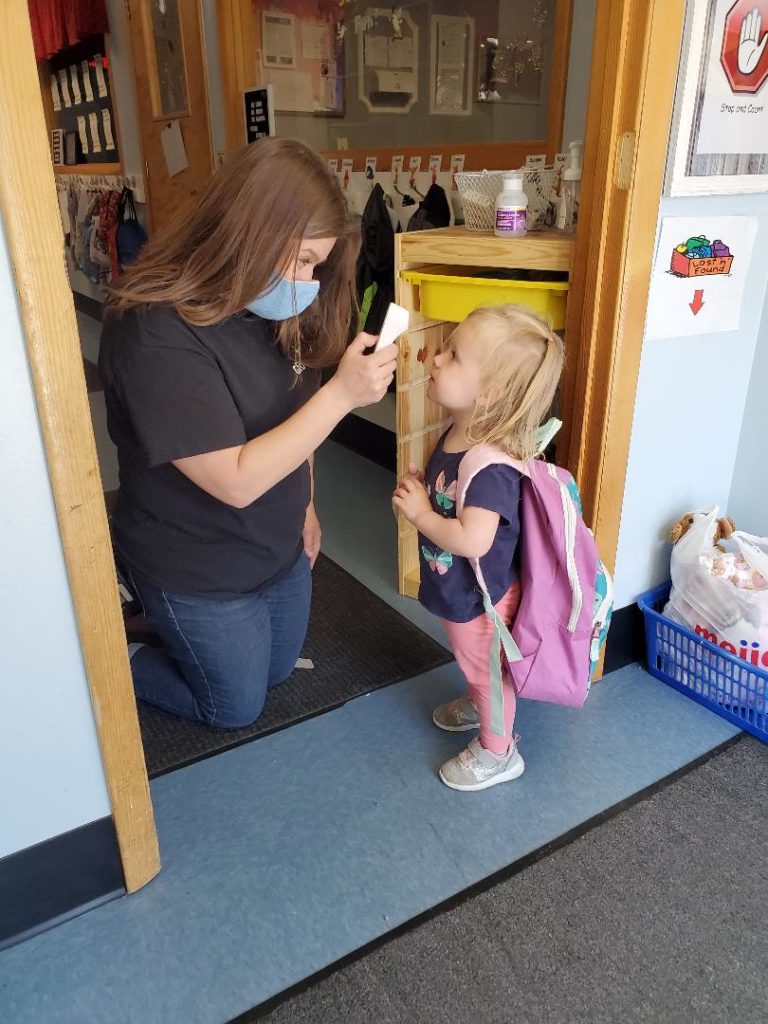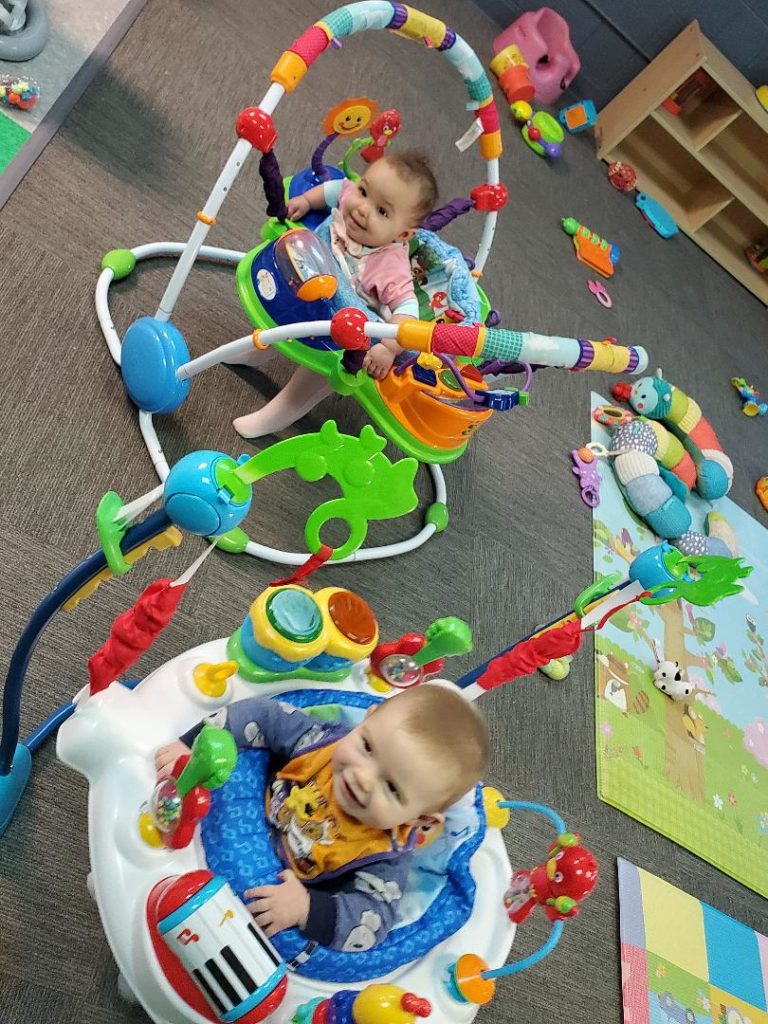COVID-19 grants help child care providers produce li’l graduates
Published on July 2, 2020 in Crisis Relief
When Melissa Klimes drops off her 2-year-old daughter and 5-year-old son at Li’l Graduates Child Development Center before heading to her job as a lab technician, it’s a much different experience than before the COVID-19 pandemic.
She stops at the lobby instead of walking her children into their classrooms. The kids have their temperatures checked by staff members donning facemasks. And instead of lingering to chat with other parents and teachers, conversations are brief and there is at least 6 feet of social distancing space between each person.
“My son had a hard time with the facemasks at first and missing his classmates who were now at home, but his teachers have been amazing and helped him get more comfortable,” Melissa said.
In the age of COVID-19, when few things remain the same, early childhood education is no exception. In fact, it’s among the hardest hit sectors.

Workers at Li’l Graduates Child Development Center keep their social distance.
CARING FOR THE CARE PROVIDERS
For decades, United Way for Southeastern Michigan has supported children, families and communities by investing in quality child care. When the pandemic hit, the need accelerated.
“We knew we needed to respond quickly to raise funds and deploy them into the community,” said Jeff Miles, director of the Center for Early Childhood Excellence at United Way for Southeastern Michigan.
United Way launched the COVID-19 Community Response Fund in March to address the emergency needs of community organizations working to help individuals and families in Southeastern Michigan meet their basic needs.
In mid-March, when Gov. Gretchen Whitmer announced Michigan’s Stay Home, Stay Safe executive order, Jeff estimates that as many as 90 percent of child care centers were forced to shut down temporarily. Those that stayed open were limited to providing care only for the children of essential workers.
At Li’l Graduates, that meant about an 85 percent reduction in income, caring for between 15-30 children each day instead of the regular enrollment of 200.
United Way provided $2,000 operational grants to Li’l Graduates and 124 other child care providers to help with rent, utilities, supplies, personal protective equipment (PPE) and other needs.
“It was certainly a shock, but we were committed to figuring it out and being there for the families who needed us,” said Jamie Middaugh, Li’l Graduates director. “We’re glad the United Way was there for us in return.”
A seat at many tables
In an unprecedented situation like the current global pandemic, United Way is uniquely positioned to help. By bringing together a variety of stakeholders, we can to forge the best path forward in a region where 44 percent of households were already struggling to make ends meet.
“There was no obvious infrastructure in place to get the ball rolling providing the needed connections, wraparound support and funding,” Jeff said. “We’ve been a conduit for municipal and government stakeholders, philanthropy partners, and educators to support providers and families.”
Shauna Aitson, director of the Southeastern Early Childhood Support Network Center for Early Childhood Excellence, agreed.
“We’ve been able to offer a seat at many tables in order to support providers and connect the dots to needed resources,” Shauna said. “Allowing child care providers’ needs and voice to be heard has been critical to being able to help families during this difficult time.”
Through the Early Childhood Support Network (ECSN), United Way provides oversight, monitoring, training and technical assistance for two Great Start to Quality Resource Centers and provides training and technical support for the region’s Great Start Collaboratives and Parent Coalitions.

Temperature checks are one of many COVID-19 safety protocols at Li’l Graduates Child Development Center.
Training goes virtual
COVID-19 also impacted the weekly, in-person training sessions, which help providers improve their practices.
With the support of our Center for Early Childhood Excellence and funding from the Office of Great Start and UWSEM, our Early Learning Community network moved quickly to build an online platform for trainings so that care providers could continue their education – increasing the quality of care available to families.
In April, our teams also made calls to more than 2,000 child care providers to discuss their immediate needs and longer-term priorities.
“What really struck us about these conversations is the emotional level of their commitment,” Carol Tresik, director of the Great Start to Quality Wayne-Oakland-Macomb Resource Center said. “There’s so much fear of them not being able to continue this critical work. They’re looking to us to help them continue doing this work and to do it safely.”
Prioritizing safety
At Li’l Graduates, the staff, led by owner Allison Ludwig, is going above and beyond to maintain a safe learning environment.
A variety of new procedures have been implemented in accordance with CDC guidelines. Surfaces and toys are routinely disinfected throughout the day and each student has their hand stamped in the morning to encourage good handwashing practices.
“Our teachers have been great with following each new procedure – implementing them quickly – and communicating with parents,” Jamie said.
The constant communication has been key for parents like Nicole Hawk whose two sons attend Li’l Graduates.
“They somehow managed to give you a sense of calm in the midst of the storm that’s going on around you,” Nicole said.

Even babies keep their social distance at the facility.
Consistency is key
At the start of the pandemic, Nicole and her husband were forced to have difficult conversations about what would happen if Li’l Graduates was unable to remain open.
“I honestly don’t know what we would’ve done,” she said. “It would’ve meant a loss of income and a major lifestyle change if one of us had to stay home.”
Nicole also worried about the potential impact on her son’s education.
“My oldest is heading into kindergarten next year and that’s such a critical time. To keep him ready for kindergarten, consistency is key.”
Not every essential worker had child care options in place. Fortunately, as of May, we’ve been able to support 542 families including 830 children with finding quality child care providers through the Great Start to Quality Resource Centers.
Coping with uncertainty
COVID-19 has shone a spotlight on the essential nature of many jobs outside of the healthcare industry.
Quality child care is critical to the economic ecosystem, enabling parents to work and providing a solid foundation for children.
“Before COVID-19, many child care workers felt overlooked,” Carol said. “They were the ‘babysitters,’ but now they’re getting the attention they deserve. Our hope is that this will lead to increased funding opportunities and respect for the critical role they play in ensuring the future.”
In response to COVID-19, the State of Michigan established the Child Care Relief Fund, a grant program that helps child care providers cover costs. The goal of the program is to help providers stay in business and make child care more affordable for Michigan families.
Jamie said the funding is helpful but at the end of the day, it’s all about the children.
“Our children, who have been through so many changes through all of this, have remained brave and strong,” Jamie said. “Moving forward, we will continue to build our future through love, encouragement, learning, and safety.”
For more information on how United Way is helping during the pandemic, check out our COVID-19 Impact Overview.